If you’re reading this, you’re probably about to choose a new CRM tool for your business or you’re thinking of migrating from Salesforce CRM to other tools that can closely meet your needs. The truth is choosing the right CRM for your business can be a little tricky, especially when you have a plethora of options.
But not to worry, we’ve done all the work for you. In this article, we’ll show you 10 Salesforce CRM alternatives that you can use to grow your business and make your sales and marketing team super productive when it comes to managing customer relationships and closing more deals. At the end we’ll offer you our recommendations which you can choose to follow or not. Let’s get down to business.
List of Top 10 Salesforce CRM Alternatives
Here’s a list of 10 Salesforce CRM alternatives that we’ve compiled from extensive research.
1. Zoho CRM
2. Pipedrive
3. Hubspot CRM
4. Microsoft Dynamics
5. Bitrix24 CRM
6. Freshsales
7. NetHunt CRM
8. Salesflare
9. BIGContacts
10. Insightly
However, don’t be in a hurry to make a choice now until you’ve read the comparison below.
Comparing Salesforce CRM Alternatives for Businesses
Now, let’s show you what you can expect from each of these CRM tools including their pros and cons.
Zoho CRM
Zoho CRM is a comprehensive cloud-based customer relationship management solution designed to meet the requirements of both small-scale businesses and large-scale enterprises.
Its notable features encompass contact management, sales funnels, pipeline management, workflow automation, AI-driven conversational assistant, task management, marketing campaign oversight, sales forecasting, customer support and service, inventory management, as well as robust reporting and analytics.
Zoho is one Salesforce CRM alternative that is preferred by businesses in various industries for its adaptable interface. The CRM allows effortless customization to align with specific business needs, facilitating direct customer engagement within the application.
Zoho CRM also provides automation for repetitive tasks, ensuring timely completion. Its robust reporting capabilities contribute to enhanced forecasting and informed business decision-making. You can also turn on notification reminders on the tool, so you never miss any important update or deadline.
While Salesforce boasts an extensive array of integration options, Zoho CRM emerges as a more affordable alternative, offering a wide range of both native and third-party integrations.
Teams can seamlessly integrate popular apps such as LinkedIn, Slack, Google, etc. with Zoho, ensuring synchronised data across multiple systems and enhanced tool functionality. Zoho also provides numerous native apps for integration, including the Writer Add-on, Finance Suite, Zoho Desk, Zoho books, Projects and many more.
Advantages
-
Free plan and flexible paid options, contrasting with Salesforce
-
Affordable workflow and task automation functionalities
-
Extensive integration capabilities with thousands of external and native apps
-
Incorporates built-in sales gamification features
Drawbacks
-
Platform requires a certain level of technical proficiency for setup and operation. However, you can always contact an Advanced Zoho Partner to help you implement the tool and offer you the necessary training.
-
Auto-response email features come at a high cost.
-
Access to case and inventory management modules requires opting for the Professional plan.
Price
Zoho CRM has four price plans which includes:
-
Standard (₦3,600/user/month billed annually).
-
Professional – (₦6,000 /user/month billed annually).
-
Enterprise – (₦10,500/user/month billed annually).
-
Ultimate – (₦13,500/user/month billed annually).
This CRM tool also has two bundles which includes:
-
CRM Plus – ₦15,000 per user per month, billed annually
-
CRM Flex – ₦3,600, starting price for two users per month, billed annually
*Read our comprehensive comparison between Zoho CRM and Salesforce CRM.
Pipedrive
Pipedrive is an alternative CRM tool to Salesforce, which is great for lead management, task prioritisation, and performance measurement. It simplifies contact management by allowing you to see all interactions in a single location. Pipedrive additionally provides customizable reminders to prevent overlooking crucial deadlines.
The platform includes features like deal rotting detection, Smart Docs for swift document generation with auto-filled business proposals and quotes, and Smart Contact Data, which extracts LinkedIn information for profiles.
You can also organise your data by syncing with various business applications, including Google Calendar. Pipedrive is recognized for its advanced sales tools, providing insights and efficient data management. The AI Sales Assistant offers teams valuable suggestions on prioritising opportunities and tasks, contributing to enhanced performance.
Like Salesforce, Pipedrive lacks a free-forever option but stands out with more budget-friendly paid plans and economical product catalogue, automation, email, and lead management, AI tools. However, Pipedrive lacks certain built-in features present in Salesforce, such as capabilities for accounts, customer case, and social media management. Salesforce and Zoho CRM offer a broader array of third-party and native integration options.
However, unlike Zoho CRM, both Salesforce and Pipedrive lack a native project management module/tool for sales teams to collaborate on tasks beyond regular operations, like content development or client gift delivery.
Advantages
-
Integrated meeting and video call scheduling tools
-
Impressive lead management capabilities
-
Comes with Smart Docs and Smart Contact Data for automated document filling with contact information and insightful auto-population of contact details.
-
Affordable artificial intelligence (AI) functionalities.
Drawbacks
-
Doesn’t have a free plan.
-
Excludes social media campaigns or monitoring functionalities.
-
Absence of built-in account or case management modules, a feature present in Salesforce.
Price
You can choose from five pricing plans on Pipedrive which are:
-
Essential – US$9.90 Per user per month, billed annually
-
Advanced – US$19.90 Per user per month, billed annually
-
Professional – US$39.90 Per user per month, billed annually
-
Power – US$49.90 Per user per month, billed annually
-
Enterprise – US$59.90 Per user per month, billed annually
Hubspot CRM
HubSpot is a Salesforce CRM alternative for Businesses. It’s a CRM platform that brings your teams together, gives useful insights, and lets you report on growth. It has Marketing Hub, Sales Hub, Service Hub, and CMS, plus many integrations for smooth marketing, sales, and service. Good for small and big businesses, and any team like marketing, sales, customer service, operations, or C-suite.
The CRM automates tasks like entering, syncing, and updating data, making the buyer’s journey better. HubSpot keeps track of all interactions with a contact on their timeline, making a single data source for your whole team, whether in sales, marketing, service, or ops.
Using this CRM tool, sales teams can save contact, lead, and deal details, plan meetings, generate quotes, handle documents, and check prospect website visitors. Also, the CRM allows marketing teams to make and send email campaigns with one automated action, handle a blog, interact with web visitors through live chat, and form digital ads and web forms. It also includes free customer support ticketing features and user access management.
Pros
-
Automated lead assignment and rotation features are relatively costly compared to Salesforce.
-
Deal and lead scoring are exclusive to the expensive Professional plan.
-
Effective sales team management requires the adoption of the Enterprise plan.
Cons
-
Offers a free plan for unlimited users, unlike Salesforce, which lacks a free option
-
Features a user-friendly interface for seamless navigation and operation.
-
Provides service management with ticketing, customer meeting scheduling, and ticket pipelines at no cost.
-
The free plan includes email marketing, ads, segmentation, a blog, contact and deal management, along with user access controls.
Price
-
Hubspot CRM suite has the following pricing plans:
-
Starter – $20 per month, billed annually for individuals and small teams.
-
Professional – $1,600 per month, billed annually.
-
Enterprise – $5,000 per month, billed annually.
Microsoft Dynamics
Microsoft Dynamics 365, is another popular Salesforce alternative. Microsoft Dynamics is both an ERP and CRM software that includes cloud-based campaign management, social insights, and business intelligence (BI).
It offers various apps for integrated customer relationship management. These apps enable mobile device management and syncing data from social media and other business tools with your CRM.
Real-time, AI-powered insights help in acquiring qualified leads and gaining a deep understanding of your audience. Dynamics derives these insights from behavioral, demographic, transactional, feedback, and engagement data, ensuring accuracy and actionable information. You can access this CRM through the cloud, you can host it, or you can use it on Microsoft’s own environment.
Pros
-
A set of smart business tools that make work smoother and create great customer experiences.
-
Ready-made pieces of software that easily link up with what you already use.
-
Apps that join together to improve how things work, spark new ideas in teams, and make customers happy.
-
A method that puts data first to make customer experiences better, using both unified data and Microsoft AI.
-
Includes built-in safety measures to protect business and customer information.
Cons
-
The onboarding process can be difficult and time-consuming due to its complexity.
-
Technical issues such as system crashes and problems with data migration may disrupt operations.
Price
-
Business Central Essentials – From $70 per user/month
-
Business Central Premium – From $100 per user/month
-
Customer Service Professional – $50 per user/month or $20 per user/month
-
Sales Professional – $65 per user/month or $20 per user/month
Bitrix24 CRM
Salesforce lacks an integrated project management system in its CRM, prompting users to integrate with its native Project Management app or a third-party solution. Bitrix24 addresses this by providing a built-in project management module, offering features like task management, project template storage, and versatile views on Kanban, Gantt, and list displays. In addition, Bitrix24 stands out for its diverse applications, encompassing lead, deal, and contact management, an ecommerce CRM module, human resources tools, and a contact center.
Every product provides extensive data management features for storing and monitoring lead, contact, and deal information, along with quotes and invoices. Moreover, they offer diverse communication channels with customers and contacts, including phone integrations, email, chat, and social media.
Bitrix24 distinguishes itself from Salesforce with a free plan for unlimited users, integrated ecommerce capabilities, and tools for human resource management. Both Bitrix24 and Salesforce receive low ratings in terms of product usability, demanding a considerable skill level to grasp and navigate their interfaces. In contrast, HubSpot, Zoho CRM, and Freshsales have garnered positive reviews for their platform intuitiveness, offering better ease of use depending on your specific feature needs.
Pros
-
Unlimited users can is the Free plan.
-
Integrated project management tool provided at no cost
-
Incorporates invoice and quote features in the primary CRM plan, contrasting with Salesforce that mandates add-ons or a pricier plan.
Cons
-
Low usability ratings for configuring the CRM platform, utilizing features, and navigating the interface
-
Higher costs for access, role-based, and user permission management in comparison to Salesforce
-
Lead records storage only accessible starting from the Standard plan
Price
-
Free Plan
-
Basic – US$ 43
-
Standard – US$ 87
-
Professional – US$ 175
-
Enterprise – US$ 325
Freshsales
Freshsales stands out as a Salesforce alternative, particularly suitable for businesses in need of a robust account management CRM system. The platform features a pre-designed account management module, allowing users to store point-of-contact data, activity and communication history, and tasks related to a specific account. The more expensive plans offer automated data enrichment for these profiles. Additionally, Freshsales excels in account and contact engagement, providing a built-in phone system, email, and live chat channels.
Freshsales boasts several advantages over Salesforce, particularly in terms of pricing and user-friendliness. Overall, Freshsales’ free-forever plan and affordable paid options outshine those of Salesforce. Users consistently find Freshsales more intuitive to navigate compared to Salesforce. Additionally, specific features like account management, phone communications, sales team management, workflow automation, live chat, and email come at a lower cost with Freshsales.
Utilising automated profile and data enrichment features proves beneficial in maintaining clean and current contact records. Regrettably, both Salesforce and Freshsales offer costly profile enrichment features.
Pros
-
Provides a free plan and scalable paid options at a more budget-friendly rate compared to Salesforce.
-
The interface and features are more user-friendly and easier to learn compared to Salesforce.
-
The Growth plan includes a built-in phone system, account management, and live chat engagement.
Cons
-
The mobile app primarily focuses on record management and notes, lacking the extensive capabilities of Salesforce Mobile. It lacks built-in case management features available in Salesforce. The lead auto-assignment capabilities are costly compared to Salesforce.
Price
-
Growth – $15/user/month, billed annually.
-
Pro – $39/user/month, billed annually.
-
Enterprise – $69/user/month/ billed annually.
What to look for when choosing Salesforce CRM alternatives
When you’re trying to pick an alternative for Salesforce CRM, look out for these things.
Affordability
Salesforce can be a very expensive CRM tool, however, some available Salesforce alternatives like Zoho CRM can offer you the same value at an affordable price. So, when you’re comparing CRM tools check for their pricing plans and what each price bundle comes with. This will help you know the right plan to opt for depending on your company size and the features you need to get work done.
Support
Salesforce provides decent support, but there’s room for improvement. Their support can be expensive, and free assistance is only available for severe issues affecting all users. While they offer Salesforce University to enhance software use, it comes with an extra cost.
Customization
Customisation is crucial for effective and efficient sales management, but Salesforce has some limitations in this aspect. It doesn’t offer as many customization choices as some other platforms, and their toolkits for customization can be somewhat challenging to use.
Moreover, extra customization comes with an expensive cost. Therefore, if you’re researching Salesforce competitors, looking out for the level of customisation these tools offer can be a great place to start.
Features
To find the right Salesforce alternatives for small businesses, you can also check different aspects of popular CRM options and compare them to Salesforce. You can consider things that Salesforce lacks, such as a free forever plan and a straightforward interface.
You can also look at what Salesforce is known for, like its lead management and data analytics capabilities. Your goal should be to find alternative CRM solutions that could either match or replace Salesforce based on the specific features your company needs.
Reporting
Salesforce excels in reporting, but at times, their reports can be a bit complicated and less intuitive. Some users might prefer a software solution that simplifies the process of creating and understanding reports, making it easier to apply to their sales cycle.
Our Recommendation
Zoho CRM stands out as our top choice for an overall alternative to Salesforce. It addresses several gaps in Salesforce, offering a free plan and a user-friendly interface. While alternatives like Freshsales provide key Salesforce features such as AI analytics, sales task automation, and multi-channel engagement, other CRMs on the list may be more suitable if you’re specifically seeking attributes like project management, referral tracking, or a broader range of integrations to replace Salesforce.
We chose Zoho CRM because apart from the robust CRM tool and affordable pricing plans, Zoho has a range of other tools for project management, human resources, financial management, inventory, workplace organisation and many other digital solutions that your business will need as it continues to expand.
This means that no matter what your company size is at this moment, with Zoho, you’ll not need to integrate different multiple tools in the future. All you have to do is expand your business by subscribing to an already existing Zoho tool that solves a challenge you have. This way, you have access to all your tools in one place and it’s easier and cheaper to manage.
Book a Free Consultation Call with our digital transformation experts that can help you select the right CRM tool, implement it from start to finish and offer the necessary training to you and your staff.
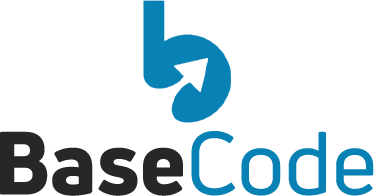
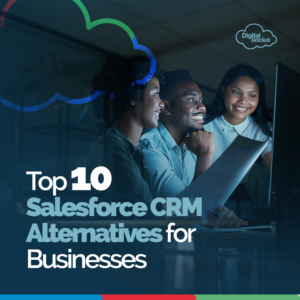
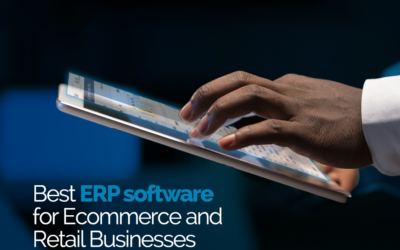
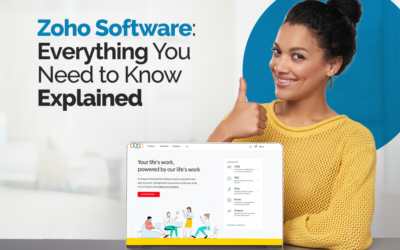
0 Comments